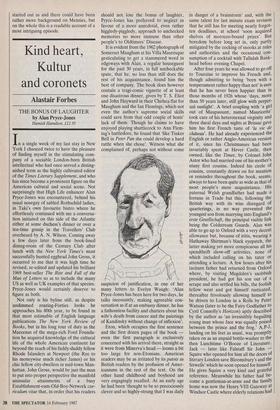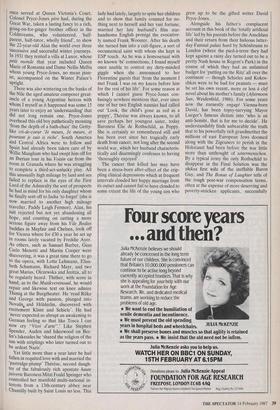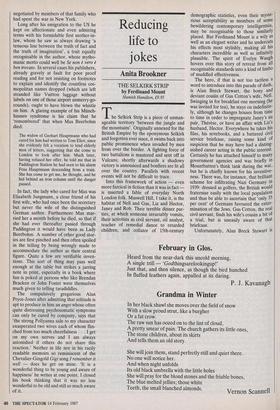Kind heart, Kultur and coronets
Alastair Forbes
THE BONUS OF LAUGHTER by Alan Pryce-Jones
Hamish Hamilton, f12.95
In a single week of my last stay in New York I chanced twice to have the pleasure of finding myself in the stimulating com- pany of a sociable London-born British intellectual who had once served a disting- uished term as the highly cultivated editor of the Times Literary Supplement, and who has since become a prominent figure on the American cultural and social scene. Not surprisingly that High Life enhancer Alan Pryce-Jones was encountered, behind his usual nosegay of sabled Rothschild ladies, in Taki's own favourite bistro where he effortlessly continued with me a conversa- tion initiated on this side of the Atlantic either at some duchess's dinner or over a tea-time gossip in the Travellers' Club overheard by A. N. Wilson. Coming away a few days later from the book-lined dining-room of the Century Club after lunch with the New York Times's most successfully hunted egghead John Gross, it occurred to me that it was high time he revised, re-edited and updated his brilliant 1969 best-seller The Rise and Fall of the Man of Letters so as to include the many US as well as UK examples of that species. Pryce-Jones would certainly deserve to figure as both.
Not only is his byline still, as despite undimmed roaring-Forties looks he approaches his 80th year, to be found in that most estimable of English language publications The New York Review of Books, but in his long tour of duty as the Maecenas of the mega-rich Ford Founda- tion he acquired knowledge of the cultural life of the whole American continent far beyond the reach of his fuddy-duddy fellow Rhode Islanders at Newport (the Rye to his moneywise much richer James) or his chic fellow city-dwellers in mid-town Man- hattan. John Gross, would be just the man to put into proper perspective the manifold uninsular attainments of a busy Establishment-cum-Old-Boy-Network cur- riculum vitae that, in order that his readers should not lose the bonus of laughter, Pryce-Jones has preferred to neglect in favour of a more anecdotal, even rather higgledy-piggledy, approach to unchecked memories no more immune than other people's to Oldtimers' Disease.
It is evident from the 1962 photograph of Somerset Maugham at his Villa Mauresque gesticulating to get a stammered word in edgeways with Alan, a regular houseguest for the past 30 years, in full uncheckable spate, that he, no less than still does the rest of his acquaintance, found him the best of company. The book does however contain a tragi-comic vignette of at least one disastrous dinner, given by T. S. Eliot and John Hayward in their Chelsea flat for Maugham and the Ian Flemings, which not even the author's supreme social skills could save from that odd couple of hosts' lack of them. Though he claims to have enjoyed playing shuttlecock to Ann Fiera- ing's battledore, he found that 'like Tinker Bell in Peter Pan she could develop a hard rattle when she chose'. Witness what she complained of, perhaps not without some suspicion of justification, in one of her many letters to Evelyn Waugh: 'Alan Pryce-Jones has been here for two days, he talks incessantly, making agreeable con- versation as if at an embassy dinner, he has a fathomless facility and chatters about his wife's death from cancer and the paintings of Kandinsky without change of inflexion'.
Eton, which occupies the first sentence and the first dozen pages of the book even the first paragraph is exclusively concerned with his arrival there, straight as it were from Minerva's head — looms a bit too large for non-Etonians. American readers may be as irritated by its patois as British readers by the profusion of Amer- icanisms in the rest of the text. On the other hand childhood and boyhood are very engagingly recalled. At an early age he had been 'thought to be so precociously clever and so highly-strung that I was daily in danger of a brainstorm' and, with the same talent for last minute exam revision that he still has for meeting nearly forgot- ten deadlines, at school 'soon acquired shelves of morocco-bound prizes'. But boredom before long set in, only partly mitigated by the cocking of snooks at rules and authorities and the occasional con- sumption of a cocktail with Tallulah Bank- head before evening Chapel. After four years he was allowed to go off to Touraine to improve his French and, though admitting to being 'born with a temperament rather happy than not' is sure that he has never been happier than in those months of 1926 whose 'days, more than 50 years later, still glow with perpet- ual sunlight'. A brief coupling with 'a girl out of Maupassant, named Mauricette' took care of his heterosexual virginity and three ducal days and nights at Brissac gave him his first French taste of 'la vie de chateau'. He had already experienced the English or rather Anglo-American version of 'it, since his Christmasses had been invariably spent at Hever Castle, then owned, like the Times, by Colonel John Astor who had married one of his mother's many first cousins. Indeed his circle of cousins, constantly drawn on for mention or reminder throughout the book, seems, always to have been quite as wide as that of most people's mere acquaintance. His paternal Welsh grandfather had made a fortune in Trade but this, following the British way with its wise disregard of quarterings, in no way prevented the youngest son from marrying into England's erste Gesellschaft, the principal visible link being the Coldstream Guards. Alan was able to go up to Oxford with a very decent allowance but, because of iritis, wearing a Hathaway Shirtman's black eyepatch, the latter making yet more conspicuous all his spendthrift show-off activities, none of which included calling on his tutor or attending a lecture. A few hours after his taciturn father had returned from Oxford where, by visiting Magdalen's snobbish president, he had got his son out of a scrape and also settled his bills, the foolish fellow went and got himself rusticated, thereafter frivolously allowing himself to be driven to London in a Rolls by Peter Watson (later to be the Fairy Godfather to Cyril Connolly's Horizon) aptly described by the author as 'an irresistibly beguiling young man whose face was equally poised between the prince and the frog.' A.P-J, landing on his feet as usual, was promptly taken on as an unpaid bottle-washer to the then Lunchtime O'Booze of Literature, Jack — later like Falstaff Sir John Squire who opened for him all the doors of literary London save Bloomsbury's and the Sitwells' which he soon opened for himself. He gives Squire a very kind and grateful reference, Meanwhile his father had be- come a gentleman-at-arms and the familY home was now the Henry VIII Gateway at Windsor Castle where elderly relations had once served at Queen Victoria's Court. Colonel Pryce-Jones pere had, during the Great War, taken a lasting fancy to a rich, going-on-for-ginger brother officer in the Coldstreams, who volunteered, 'half- parent, half-tutor, wholly friend', to show the 22-year-old Alan the world over three successive and successful winter journeys. In 1931 they rented a villa at Luxor, whose petit monde that year included Queen Marie of Romania and Dame Nellie Melba whom young Pryce-Jones, no mean pian- ist, accompanied on the Winter Palace's upright.
There was also wintering on the banks of the Nile the aged amateur composer great- uncle of a young Argentine heiress with whom I myself as it happened was some 15 years later to enjoy an 'understanding' that did not long remain one. Pryce-Jones overhead this old boy pathetically moaning `from the depth of a bath-chair' the Getty- like cri-de-coeur meurs, Je meurs, et pourtant je suis si riche'. South America and Central Africa were to follow and Spain had already been taken care of by Willie Maugham who had swept him off for an Iberian tour in his Voisin car from the room in Granada where he was struggling to complete a third-act-unlucky play. All this unusually high mileage by land and sea failed to replace in the eyes of the First Lord of the Admiralty the sort of prospects he had in mind for his only daughter whom he finally sent off to India 'to forget' (she is now married to another high mileage traveller, Paddy Leigh Fermor). Alan, his suit rejected but not yet abandoning all hope, and counting on cutting a more serious figure away from his Vile Bodies buddies in Mayfair and Chelsea, took off for Vienna where for £30 a year he set up in rooms lately vacated by Freddie Ayer. As others, such as Samuel Barber, Gian Carlo Menotti and Martin Cooper were discovering, it was a great time there to go to the opera, with Lotte Lehmann, Elisa- beth Schumann, Richard Mayr, and two great Marias, Olczewska and Jeritza, all to be regularly heard. Thither, with score in hand, as to the Musikvereinsaal, he would repair and likewise text on knee admire Thimig at the Burgtheater. He 'read Rilke and George with passion, plunged into Nova and Haiderlin, discovered with excitement Klimt and Schiele'. He had `never expected so abrupt an awakening to German feeling so that like Tosca I can now cry "Vissi d'arte".' Like Stephen Spender, Auden and Isherwood on Ber- lin's lakesides he 'shared the religion of the sun with striplings who later turned out to be ardent Nazis'.
Yet little more than a year later he had fallen in requited love with and married the `Partridge-plump' Therese, second daugh- ter of the fabulously rich apostate haute Juiverie Baroness Mitzi Fould Springer who controlled her manifold multi-national in- terests from a 13th-century abbey near Chantilly built by Saint Louis no less. This lady had lately, largely to spite her children and to show that family counted for no- thing next to herself and her vast fortune, married her late husband's film star- handsome English protégé the evocative- ly named Frank Wooster. After his death she turned him into a cult-figure, a sort of oecumenical saint with whom she kept in ESP touch. As he was a homosexual with no known 'hi' connections, I found myself once unable to control my dirty-minded giggle when she announced to her Florentine guests that 'from the moment I met Frank I was on my knees before him for the rest of his life'. For some reason at which I cannot guess Pryce-Jones con- fusingly nowhere mentions that, ever since one of her two English nannies had called out 'Look, the child's gone as red as a poppy', Therese was always known, to all save perhaps her youngest sister, today Baroness Elie de Rothschild, as Poppy. She is certainly so remembered still and has been ever since her tragically early death from cancer, not long after the second world war, which her husband characteris- tically and disarmingly confesses to having `thoroughly enjoyed'.
The cancer that killed her may have been a stress-born after-effect of the crip- pling clinical depressions which at frequent intervals clouded her happy marriage from its outset and cannot fail to have clouded to some extent the life of the young son who grew up to be the gifted writer David Pryce-Jones.
Alongside his father's complacent account in this book of the 'totally artificial life' led by his parents before the Anschluss and their return from their hideous latter- day-Faninal palais hard by Schonbrunn to London (where the pied-a-terre they had kept against a rainy day turned out to be a pretty Nash house in Regent's Park) in the course of which they had an unlimited budget for 'putting on the Ritz' all over the continent — though Schieles and Kokos- chkas were to be had for peanuts — must be set his own recent, more or less a clef novel about his mother's family (Afternoon Sun, Weidenfeld, 1986). For some years now the earnestly engage Vienna-born David, has been topsy-turvying Mayor Lueger's famous dictum into 'who is an anti-Semite, that is for me to decide'. He understandably finds unbearable the truth that to his powerfully rich grandmother the millions of east European Jews doomed along with the Zigeuners to perish in the Holocaust had been before the war little more than unthought of untermenschen. By a typical irony the only Rothschild to disappear in the Final Solution was the shiksa first wife of the ineffable Baron Guy, and The Bonus of Laughter tells of the tough post-war compensation terms, often at the expense of more deserving and poverty-stricken applicants, successfully negotiated by members of that family who had spent the war in New York.
Long after his emigration to the US he kept on affectionate and even admiring terms with his formidable first mother-in- law, whom he saw as always drawing 'a tenuous line between the truth of fact and the truth of imagination', a trait equally recognisable in the author, whose mytho- manic motto could well be Se non e vero e ben trovato. In several cases his publishers, already gravely at fault for poor proof reading and for not insisting on footnotes to explain and identify the countless cos- mopolitan names dropped (which are left stranded like Vuitton luggage without labels on one of those airport unmerry-go- rounds), ought to have blown the whistle on him. A glaring example of his Munch- hausen syndrome is his claim that he `remembered' that when Max Beerbohm died:
The widow of Gerhart Hauptmann who had cared for him had written to Tom Eliot, since she evidently felt a vocation to tend elderly men of letters, suggesting that she come to London to look after him. Much later, having refused her offer, he told me that in Paddington Station he had seen to his alarm Frau Hauptmann descending from a train. She has come to get me, he thought, and he hid behind an iron column until the danger passed.
In fact, the lady who cared for Max was Elisabeth Jungmann,,a close friend of his first wife, who had once been the secretary but never the wife of the distinguished German author. Furthermore Max mar- ried her a month before he died, so that if she had ever thereafter passed through Paddington it would have been as Lady Beerbohm. A number of other good stor- ies are first pinched and then often spoiled in the telling by being wrongly made to accommodate the author as their central figure. Quite a few are verifiable inven- tions. This sort of thing may pass well enough at the table but strikes a jarring note in print, especially in a book where fun is poked at persons who like Brendan Bracken or John Foster were themselves much given to telling taradiddles.
The compulsively gregarious Alan Pryce-Jones after admitting that solitude is apt to produce in him an angst whose often quite distressing psychosomatic symptoms can only be cured by company, says that `the strong Pollyanna side to my character exasperated two wives each of whom flin- ched from too much cheerfulness . . . I get on my own nerves and I am always astonished if others do not share this reaction.' Neither in life nor in his racily readable memoirs so reminiscent of the Chevalier-Gingold Gigi song I remember it well — does he get on mine. 'It is a wonderful thing to be young and aware of happiness' he writes at one point. I closed his book thinking that it was no less wonderful to be old and still so much aware of it.




























































 Previous page
Previous page